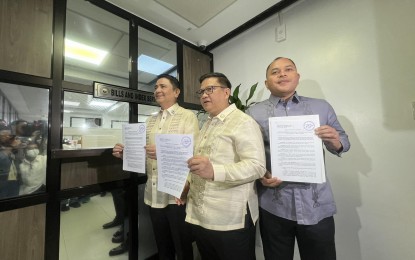
ECONOMIC PROVISIONS. Senior Deputy Speaker Aurelio Gonzales Jr. (from left), Majority Leader Manuel Jose Dalipe and Deputy Majority Leader David Suarez on Monday (Feb. 19, 2024) file Resolution of Both Houses (RBH) 7 seeking to amend certain economic provisions of the 1987 Constitution. RBH7 proposes economic Charter amendments similar to Senate's RBH6, particularly addressing restrictions on foreign ownership of public utilities, educational institutions, and advertising industries. (Photo courtesy of Speaker's office)s. (Photo courtesy of Speaker's office)
MANILA – House leaders on Monday filed a resolution seeking to amend certain economic provisions of the 1987 Constitution.
Senior Deputy Speaker Aurelio Gonzales Jr., Majority Leader Manuel Jose Dalipe, and Deputy Majority Leader David Suarez filed Resolution of Both Houses (RBH) 7, which proposes economic Charter amendments similar to Senate's RBH6, particularly Articles XII (National Economy and Patrimony), XIV (Education, Science, Technology, Arts, Culture, and Sports), and XVI (General Provisions).
Gonzales noted that the proposed changes would address restrictions on foreign ownership of public utilities, educational institutions, and advertising industries.
"Our RBH proposals are in toto to the Senate RBH. Parehong pareho po. Kailangan na rin namin pag-usapan ang mga proposed amendments at sabayan ang Senado para mapabilis ang proseso lalo na ang target ng Senado sabi ni Senate President Migs [Juan Miguel Zubiri] ay matatapos nila bago mag Holy Week (It is very similar. We need to start our own deliberations on the proposed amendments to keep up with the Senate and speed up the process, especially with Senate President Migs' target deadline [to pass RBH6] before the Holy week recess)," Gonzales said.
Gonzales said the proposal leaves to Congress the discretion to adjust the foreign ownership percentage with the phrase "unless otherwise provided by law".
"It will give Congress the discretion to adjust the percentage of ownership of Franchises, Educational Institutions and Advertising Industries. Pwede irelax o pwede din restrict (We could either relax or restrict)," he said.
Both resolutions call for a constitutional assembly as a mode for amending the Charter by restating the constitutional provision that Congress may propose amendments "upon a vote of three-fourths of all its members".
Gonzales said President Ferdinand R. Marcos Jr. and congressional leaders--Speaker Martin Romualdez and Senate President Zubiri--have agreed that certain economic provisions in the Constitution need to be relaxed.
Gonzales further cited the President as saying that the 1987 Constitution "was not written for a globalized world", emphasizing the need to amend it to boost the Philippine economy and attract more foreign investments.
More agile Philippine economy
In a press briefing, House Assistant Majority Leader and Nueva Vizcaya Rep. Mikaela Suansing said one of the key reasons for amending the Constitution's economic provisions is to enhance the flexibility and adaptability of the Philippine economy amid a rapidly changing global landscape to generate more jobs for Filipinos.
"To this end, we need to amend the Constitution to allow for greater flexibility. Inserting the phrase ‘unless otherwise provided by law’ in the economic provisions of the Constitution would expand the scope of policymaking tools of our national economic managers to ensure that our economic policy framework continually keeps up with the evolving global economic landscape and keep the Philippine economy at par with global competition," Suansing said.
Suansing noted that the international investment community perceives the country's foreign direct investment (FDI) rules as the third most restrictive in the world, based on the FDI Regulatory Restrictiveness Index.
"This perception has affected our country's FDI inflows and has hampered our competitiveness vis-à-vis our neighbors in the ASEAN region," she said, adding that the Philippines ranks 6th in the ASEAN region in terms of FDI inflows, accounting for only 3 percent of the region's total.
She further argued that the constitutional restrictions on foreign ownership may be a "deterrent" in the country's participation in highly beneficial trade agreements, thus translating to huge opportunity costs. (PNA)
